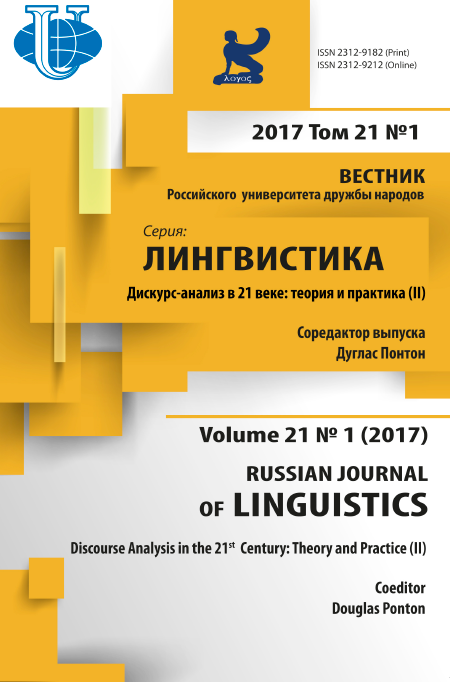Метафора и грамматика в поэтическом изображении природы
- Авторы: Гоутли Э.1
-
Учреждения:
- Университет Линнань
- Выпуск: Том 21, № 1 (2017): Дискурс-анализ в 21 веке: теория и практика (II)
- Страницы: 48-72
- Раздел: Статьи
- URL: https://journals.rudn.ru/linguistics/article/view/15404
- DOI: https://doi.org/10.22363/2312-9182-2017-21-1-48-72
- ID: 15404
Цитировать
Полный текст
Аннотация
Данная статья основана на двух положениях, которые уже были доказаны в литературе по анализу экологического дискурса. Первое - это то, что в активных предложениях с конгруэнтной функцией (Halliday, Matthiessen 2004), человек предстает как исполнитель однонаправленных действий, совершаемых им над пассивной природой (Goatly 2002, 2007). Второе положение заключается в том, что в большинстве случаев в экологическом дискурсе, как, например, в сообщениях Института всемирного наблюдения (Worldwatch Institute), где такая грамматика используется, недооценивается сила природы, которая не зависит от человека и способна властвовать над ним (Goatly, Hiradhar 2016). Автор опирается на уже проведенные ранее исследования (Goatly 2000, 2007, Goatly, Hiradhar 2016), в которых показано использования неконгруэнтных грамматических форм, различных видов метафор для описании отношений между человеком и природой в русле современной науки. Автором проанализирован ряд поэтических текстов, среди которых «Прелюдии» Уильяма Вордсворта, избранные стихотворения Эдварда Томаса и поэтический сборник Элис Освальд «Woods». Исследование показало, что, помимо грамматического согласования и метафор, используемых для размывания границ между человеком и природой, в них встречаются субстантивация, эргативные глаголы, очувствление символов. Подчеркивается, что природа способна говорить и чувствовать, что существенно отличается от приемов, используемых в экологическом и новостном дискурсах.
Ключевые слова
Об авторах
Эндрю Гоутли
Университет Линнань
Email: apgoatly@gmail.com
Тхюньмунь, Гонконг, 8 Castle Peak Road
Список литературы
- Bohm, D. (1980) Wholeness and the Implicate Order, London: Routledge
- Goatly, A. (2007) Washing the Brain: Metaphor and Hidden Ideology, Amsterdam: Benjamins
- Goatly, A. (2011) The Language of metaphors, 2nd edition, Abingdon: Routledge
- Goatly, A. (in press) ‘The poems of Edward Thomas: a case study in Ecolinguistics’
- Goatly, A. and Hiradhar, P. (2016) Critical Reading and Writing in the Digital Age, Abingdon: Routledge
- Halliday, Michael (1994) An Introduction to Functional Grammar 2nd edition, London: Arnold
- Halliday, Michael and Matthiessen, Christian (2004) An Introduction to Functional Grammar, London: Hodder
- Harvey, D. (1996) Justice, Nature and the Geography of Difference, Cambridge Mass.: Oxford
- Langacker, R.W. (1991) Foundations of Cognitive grammar, vol. 2: Descriptive Applications, Stanford: Stanford University Press
- Levin, S.R. (1977) The Semantics of Metaphor, Baltimore: Johns Hopkins UP
- Lovelock, J. (1988) The Ages of Gaia Oxford: OUP
- Monbiot, G. (2014) ‘The pricing of everything’ http://www.monbiot.com/2014/07/24/the-pricing-of-everything/retrieved 26/07/2014
- Muhlhäusler, P. (1996) ‘Linguistic adaptation to changed environmental conditions’ in Fill, A. (ed.) Sprachokologie und Okolinguistik, Tubingen: Stauffenburg Verlag
- Oswald, A. (2005) Woods etc., London: Faber and Faber
- Prigogine, Ilya and Stengers, I. (1985) Order out of Chaos, London: Flamingo
- Schleppegrell, Mary, J. (1996) ‘Abstraction and agency in middle school environmental education’, in J. C. Bang, J. Door, Richard J. Alexander, Alwin Fill and Frans Verhagen (eds) Language and Ecology: proceedings of the symposium on ecolinguistics of AILA ’96, Jyvaskala, Odense: Odense University Press, pp. 27-42
- Semino, E. (2008) Metaphor in Discourse, Cambridge: Cambridge University Press
- State of the World 2012: creating sustainable prosperity, (2012) The Worldwatch Institute
- Thomas, E. (1949) Collected Poems, London: Faber and Faber
- Wordsworth, W. (1933/1960, first published 1805) The Prelude, Oxford University Press
Дополнительные файлы















